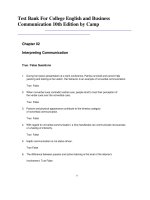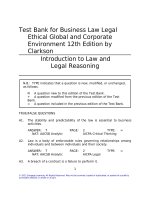Test bank for bankruptcy law and practice by luppino
Bạn đang xem bản rút gọn của tài liệu. Xem và tải ngay bản đầy đủ của tài liệu tại đây (81.87 KB, 13 trang )
Test Bank for Bankruptcy Law and Practice by Luppino
Chapter 1 Introduction to Bankruptcy
1.1 Multiple Choice Questions
1) Contemporary bankruptcy law as we know it in the U.S. is a form of
A) Compensation
B) Restitution
C) Relief
D) Punishment
Answer: C
Page Ref: 7
Objective: Understand the definition of bankruptcy.
Level: Basic
2) In 1542, King Henry VIII instituted the practice of incarcerating individuals who
were in debt in special facilities called
A) Debt camps
B) Debtors' communes
C) Debtors' prisons
D) None of these
Answer: C
Page Ref: 8
Objective: Explain the historical roots of bankruptcy law.
Level: Basic
3) The first English bankruptcy law was passed in 1570 in response to
A) King Henry VIII's wishes
B) An outcry from the banks
C) The overcrowding of debtors' prisons
D) The overcrowding of debtors' prisons and public demand
Answer: C
Page Ref: 8
Objective: Explain the historical roots of bankruptcy law.
Level: Basic
4) The goals for modern bankruptcy law in the U.S. include
A) A fresh start for the debtor and the efficient administration of bankruptcy
proceedings
B) Maximizing the amounts debtors pay to the creditors and the efficient
administration of the liquidation process
C) Minimizing the amounts debtors pay to the creditors and the efficient
administration of the liquidation process
D) None of these
Answer: A
Page Ref: 9
Objective: Give examples of the goals of the American bankruptcy system.
Level: Basic
5) ________ was the first to formally abolish the debtors' prisons in 1831 with others
eventually following its lead.
Full file at />
A) New Jersey
B) Vermont
C) Massachusetts
D) New York
Answer: D
Page Ref: 9
Objective: Explain the historical roots of bankruptcy law.
Level: Basic
6) While the Constitution went into effect in 1789, it was not until just over ________
later that Congress passed the first bankruptcy law in 1800.
A) Six months
B) Twelve years
C) Ten years
D) None of these
Answer: C
Page Ref: 9
Objective: Explain the historical roots of bankruptcy law.
Level: Basic
7) It is the role and function of the ________ to maintain control over the bankruptcy
estate and preserve any of the debtor's available assets for the benefit of the creditors
or other interested parties.
A) Bankruptcy judge
B) Bankruptcy attorney
C) Bankruptcy trustee
D) Bankruptcy court
Answer: C
Page Ref: 11
Objective: Understand the definition of bankruptcy.
Level: Basic
8) An example of how creditors are protected by the Bankruptcy Code is the ability,
in some cases, to literally force an uncooperative debtor into what is known as a(n)
A) Forced case
B) Compelled case
C) Voluntary bankruptcy
D) Involuntary bankruptcy
Answer: D
Page Ref: 11
Objective: Give examples of the goals of the American bankruptcy system.
Level: Basic
Full file at />
9) As long as the debtor complies with the Bankruptcy Code, a ________ consists of
the debtor either having most of his or her debts "wiped away" or being given the
opportunity to reorganize the debt owed in a manner which is much more manageable
and realistic given their financial circumstances.
A) Set off
B) Fresh start
C) Debt consolidation
D) None of these
Answer: B
Page Ref: 11
Objective: Give examples of the goals of the American bankruptcy system.
Level: Basic
10) There is a common misconception that individuals and businesses that file for
bankruptcy are over-extended, ________ money managers who want to get out of
paying their debts.
A) Responsible
B) Irresponsible
C) Tired
D) Spendthrift
Answer: B
Page Ref: 2
Objective: Understand the definition of bankruptcy.
Level: Basic
11) Most medical debtors are
A) Middle class, have college education, and own their own homes
B) Poor, have no college education, and own their own homes
C) Wealthy
D) Indigent
Answer: A
Page Ref: 3
Objective: Recognize the causes of modern-day bankruptcy filings.
Level: Basic
12) Prior to passage of the U.S. Constitution, the governing document of the country
was the ________. There was no mention of bankruptcy in this document, so the
states were left to establish their own laws regulating the relationships between
debtors and creditors.
A) Articles of Confederation
B) Articles of the Union
C) Articles of the Colonies
D) None of these
Answer: A
Page Ref: 9
Objective: Explain the historical roots of bankruptcy law.
Level: Basic
Full file at />
13) Although one of the main goals of bankruptcy is to provide the debtor with a fresh
start, the trade-off for participation in the system is the protection and fair treatment of
A) Consumers
B) Investors
C) Creditors
D) Debtors
Answer: C
Page Ref: 11
Objective: Give examples of the goals of the American bankruptcy system.
Level: Basic
14) Prior to the passage of the ________, the states were left to establish their own
laws regulating the relationships between debtors and creditors.
A) Articles of Confederation
B) Articles of Incorporation
C) U.S. Constitution
D) U.S. Senate
Answer: C
Page Ref: 9
Objective: Explain the historical roots of bankruptcy law.
Level: Basic
15) The first English bankruptcy law was passed in ________ in response to the
overcrowding of the debtors' prisons and their increasing unpopularity among the
general public.
A) 1492
B) 1985
C) 1570
D) 1712
Answer: C
Page Ref: 8
Objective: Explain the historical roots of bankruptcy law.
Level: Basic
16) Contemporary bankruptcy law as we know it is a form of
A) Support
B) Relief
C) Restitution
D) Restoration
Answer: B
Page Ref: 8
Objective: Give examples of the goals of the American bankruptcy system.
Level: Basic
Full file at />
17) Court orders for ________, known in bankruptcy law as domestic support
obligations, as well as student loans cannot be discharged in bankruptcy.
A) Restitution and relief
B) Restoration and revival
C) Alimony and child support
D) Liens and Lis Pendens
Answer: C
Page Ref: 4
Objective: Give examples of the goals of the American bankruptcy system.
Level: Basic
18) Noncustodial parents may sometimes be subjected to court-ordered ________,
leaving little money left over for other expenses.
A) Wage executions
B) Wage impediments
C) Wage inhibitors
D) Wage garnishments
E) None of these
Answer: D
Page Ref: 8
Objective: Give examples of the goals of the American bankruptcy system.
Level: Basic
19) The ________ family is most vulnerable to bankruptcy if one of the spouses loses
his or her job.
A) Single-income
B) Blended
C) Two-income
D) Modern
Answer: C
Page Ref: 4
Objective: Recognize the causes of modern-day bankruptcy filings.
Level: Basic
20) ________ are five times more likely to file for bankruptcy and three times more
likely to watch their homes go into foreclosure.
A) Men
B) Women
C) Paralegals
D) Lawyers
E) Families
Answer: E
Page Ref: 4
Objective: Recognize the causes of modern-day bankruptcy filings.
Level: Basic
Full file at />
1.2 True/False Questions
1) There is a common misconception that individuals and businesses that file for
bankruptcy are over-extended, irresponsible money managers who want to get out of
paying their debts.
Answer: TRUE
Page Ref: 2
Objective: Recognize the causes of modern-day bankruptcy filings.
Level: Basic
2) Bankruptcy is an official, legal declaration of an individual or business's inability
to meet its financial obligations.
Answer: TRUE
Page Ref: 2
Objective: Understand the definition of bankruptcy.
Level: Basic
3) It is a myth that the number one reason couples divorce is because of financial
problems.
Answer: FALSE
Page Ref: 4
Objective: Understand the definition of bankruptcy.
Level: Basic
4) Court orders for alimony and child support, known in bankruptcy law as "domestic
support obligations," as well as student loans cannot be discharged in bankruptcy.
Answer: TRUE
Page Ref: 4
Objective: Give examples of the goals of the American bankruptcy system.
Level: Basic
5) With regard to double income households, the old saying that "two can live cheaper
than one" is not accurate.
Answer: TRUE
Page Ref: 3
Objective: Recognize the causes of modern-day bankruptcy filings.
Level: Basic
6) COBRA allows an employee to maintain his or her health insurance for a period of
two years after leaving their job.
Answer: TRUE
Page Ref: 3
Objective: Recognize the causes of modern-day bankruptcy filings.
Level: Basic
Full file at />
7) According to "Overspending in America—Statistics and Facts," by The Credit
Examiner, December 30, 2012, 25% of Americans are spending more than they earn.
Answer: TRUE
Page Ref: 5
Objective: Recognize the causes of modern-day bankruptcy filings.
Level: Basic
8) The word bankruptcy is a combination of two Latin terms, bankus and ruptus,
literally meaning "broken bench."
Answer: TRUE
Page Ref: 2
Objective: Understand the definition of bankruptcy.
Level: Basic
9) Statistics compiled by the United States Courts revealed that in 2013, there were
approximately 1,256,091 bankruptcies filed in the U.S.
Answer: FALSE
Page Ref: 2
Objective: Explain the historical roots of bankruptcy law.
Level: Basic
10) Filing for bankruptcy usually provides an absolute fresh start for many divorced
individuals.
Answer: FALSE
Page Ref: 4
Objective: Give examples of the goals of the American bankruptcy system.
Level: Basic
11) Many homeowners are unaware that special coverage is required for damage
caused by some natural disasters.
Answer: TRUE
Page Ref: 4
Objective: Recognize the causes of modern-day bankruptcy filings.
Level: Basic
12) Very often, lifestyle expenses are financed with loans and credit cards, which will
eventually catch up with the debtor, especially if coupled with a job loss, illness, or
other personal tragedy.
Answer: TRUE
Page Ref: 5
Objective: Recognize the causes of modern-day bankruptcy filings.
Level: Basic
13) Only about 50% of new small businesses stay in business 15 years or more.
Answer: FALSE
Page Ref: 6
Objective: Recognize the causes of modern-day bankruptcy filings.
Level: Basic
14) Bankruptcy attorneys have the authority to take control of the assets, investigate
Full file at />
fraud, uncover hidden assets, and recover fraudulently transferred property.
Answer: FALSE
Page Ref: 11
Objective: Give examples of the goals of the American bankruptcy system.
Level: Basic
15) Creditors are allowed to literally force an uncooperative debtor into what is
known as an involuntary bankruptcy.
Answer: TRUE
Page Ref: 11
Objective: Give examples of the goals of the American bankruptcy system.
Level: Basic
1.3 Fill in the Blank Questions
1) It is the role and function of the ________ to maintain control over the bankruptcy
estate and preserve any of the debtor's available assets for the benefit of the creditors
or other interested parties.
Answer: bankruptcy trustee
Page Ref: 11
Objective: Give examples of the goals of the American bankruptcy system.
Level: Basic
2) As long as the debtor complies with the Bankruptcy Code, a(n) ________ consists
of the debtor either having most of his or her debts "wiped away" or being given the
opportunity to reorganize the debt owed in a manner which is much more manageable
and realistic given their financial circumstances.
Answer: fresh start
Page Ref: 11
Objective: Give examples of the goals of the American bankruptcy system.
Level: Basic
3) Prior to passage of the U.S. Constitution, the governing document of the country
was the ________. There was no mention of bankruptcy in this document, so the
states were left to establish their own laws regulating the relationships between
debtors and creditors.
Answer: Articles of Confederation
Page Ref: 9
Objective: Explain the historical roots of bankruptcy law.
Level: Basic
4) ________ are short-term, high interest loans made usually to financially strapped
individuals who need an infusion of cash for one reason or another between
paychecks.
Answer: Payday loans
Page Ref: 10
Objective: Recognize the causes of modern-day bankruptcy filings.
Level: Basic
5) A(n) ________ is an individual who paid for his or her passage to the U.S.,
Full file at />
including expenses and maintenance, by contracting to work for a period of years for
their sponsors.
Answer: indentured servant
Page Ref: 8
Objective: Explain the historical roots of bankruptcy law.
Level: Basic
6) There is a common ________ that individuals and businesses that file for
bankruptcy are over-extended, irresponsible money managers who want to get out of
paying their debts.
Answer: misconception
Page Ref: 2
Objective: Recognize the causes of modern-day bankruptcy filings.
Level: Basic
7) Despite the best of intentions, a business or individual may decide that filing for
bankruptcy is the only viable solution in situations when a(n) ________, such as
excessive income taxes and fines, large lawsuit judgment, or catastrophic illness,
takes place.
Answer: insolvency event
Page Ref: 2
Objective: Recognize the causes of modern-day bankruptcy filings.
Level: Basic
8) The bankruptcy laws of the United States provide a legal and legitimate vehicle for
a(n) ________.
Answer: fresh start
Page Ref: 2
Objective: Understand the definition of bankruptcy.
Level: Basic
9) According to the American Bar Association, the primary reason for divorce is
________.
Answer: money problems
Page Ref: 4
Objective: Recognize the causes of modern-day bankruptcy filings.
Level: Basic
10) Many homeowners are unaware that ________ is required for damage caused by
some natural disasters.
Answer: special coverage
Page Ref: 4
Objective: Recognize the causes of modern-day bankruptcy filings.
Level: Basic
11) Some individuals and families have to file for bankruptcy because they live far
beyond their ________, spending much more than they earn.
Answer: means
Page Ref: 4
Objective: Recognize the causes of modern-day bankruptcy filings.
Full file at />
Level: Basic
12) Unfortunately, many who are eager and excited about starting their own business
may sign ________ for the purpose of obtaining financing, commercial space, or
business credit cards.
Answer: personal guarantees
Page Ref: 6
Objective: Recognize the causes of modern-day bankruptcy filings.
Level: Basic
1.4 Matching Questions
Match each term with the appropriate description.
A) an individual who paid for his or her passage, including expenses and
maintenance, by contracting to work for a period of years for his or her sponsors
B) the governing document of the U.S. prior to the Constitution
C) Italian word for bankruptcy
D) spending more than one earns
E) debts wiped away
F) short-term, high-interest loans that help individuals pay regular expenses
G) purchased to minimize business owner's loss of assets
H) legal procedure that allows an individual or business debt relief
I) a special facility where individuals who were in debt were incarcerated
1) Fresh start
Page Ref: 11
Objective: Understand the definition of bankruptcy.
Level: Basic
2) Personal guarantee insurance
Page Ref: 7
Objective: Recognize the causes of modern-day bankruptcy filings.
Level: Basic
3) Bankruptcy
Page Ref: 2
Objective: Understand the definition of bankruptcy.
Level: Basic
4) Payday loans
Page Ref: 10
Objective: Recognize the causes of modern-day bankruptcy filings.
Level: Basic
5) Debtors' prisons
Page Ref: 8
Objective: Explain the historical roots of bankruptcy law.
Level: Basic
Full file at />
6) Indentured servant
Page Ref: 8
Objective: Explain the historical roots of bankruptcy law.
Level: Basic
Full file at />
7) Articles of Confederation
Page Ref: 9
Objective: Explain the historical roots of bankruptcy law.
Level: Basic
8) Living beyond one's means
Page Ref: 4
Objective: Recognize the causes of modern-day bankruptcy filings.
Level: Basic
9) Banca rotta
Page Ref: 2
Objective: Understand the definition of bankruptcy.
Level: Basic
Answers: 1) E 2) G 3) H 4) F 5) I 6) A 7) B 8) D 9) C
1.5 Essay Questions
1) Describe the concept of modern day debt prisons.
Answer: The student should emphasize, that, while debtors' prisons were abolished in
1833, over the course of history, creditors have come to rely on the court system to
compel payments from debtors. Debtors face criminal penalties such as incarceration
for contempt, fines, fees, and costs associated with debt collection.
Page Ref: 9
Objective: Explain the historical roots of bankruptcy law.
Level: Intermediate
2) How does the bankruptcy code ensure the efficient administration of bankruptcy
proceedings?
Answer: Bankruptcy law has established procedures for filing the bankruptcy action
and provides a venue for interested parties to settle their grievances regarding the
debtor's insolvency in an organized, civilized manner.
Page Ref: 11
Objective: Give examples of the goals of the American bankruptcy system.
Level: Intermediate
3) How does the bankruptcy code provide for the fair treatment of creditors?
Answer: The bankruptcy code accomplishes this by authorizing the bankruptcy
court's supervision and administration of the bankruptcy case as well as providing
creditors with the opportunity to participate in the process. Creditors are also afforded
fair treatment in the settlement and distribution of the debtor's assets and are protected
when debtors with sufficient income are required to pay their debts instead of having
them totally discharged.
Page Ref: 11
Objective: Give examples of the goals of the American bankruptcy system.
Level: Intermediate
Full file at />
1.6 Critical Thinking Questions
1) Discuss the most prevalent reasons individuals file for bankruptcy.
Answer: Student should discuss loss of employment, divorce, death of a spouse,
natural disasters, living beyond one's means, poor money management, and economic
conditions.
Page Ref: 2
Objective: Recognize the causes of modern-day bankruptcy filings.
Level: Intermediate
2) What is meant by "preserving the bankruptcy estate?"
Answer: The bankruptcy trustee maintains control over the bankruptcy estate and
preserves any of the debtor's available assets for the benefit of the creditors or other
interested parties. Bankruptcy trustees have the authority to take control of the assets,
investigate fraud, uncover hidden assets, and recover property that was transferred
fraudulently.
Page Ref: 11
Objective: Understand the definition of bankruptcy.
Level: Intermediate
Full file at />









